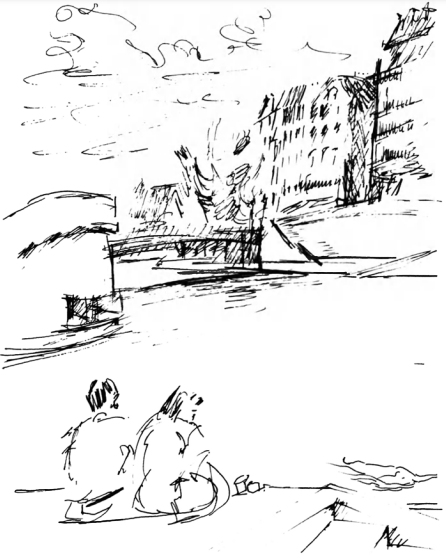27.1: Lexique
- Page ID
- 150453
Following the trend we started in the preceding Intégration unit, we give you less to do in this unit to encourage you to spend more time on one or two aspects of it (as your instructor indicates), trying to tie together all the French you've acquired in developing thoughtful answers or comments.
Lexique
1. CV and job-related words and expressions
| offrir | to offer |
| une expérience | experience |
| mettre en valeur | to underline, highlight |
| une qualité | quality |
| une potentialité | potentiality |
| une formation | (education and on-the-job) training |
| un job | job |
| un stage | period of training, instruction |
| le caractère | character (as in "good character") |
| (un personnage) | (character in a play) |
| le comportement | comportment (way of acting in a given situation) |
| le savoir-faire | knowing how to act/speak in all kinds of situations |
| un talent | talent, ability |
| les connaissances | (general) knowledge |
| irritable | irritable |
| découragé | discouraged |
| tenace | tenacious |
| calme | calm |
| persévérant | persevering |
| lutteur, -euse | combative |
| aggressif, -ive | aggressive |
| avoir besoin d'encouragements | to need encouragement |
| attendre la dernière minute | to wait for the last minute, put off |
| foncer | to go at it |
| courageux, -euse | courageous |
| organisé | organized |
| travailleur, -euse | hardworking |
| inquiet, -ète | anxious, easily worried |
| résistant au stress et à la fatigue | resistant to stress and fatigue |
| aventureux | adventurous |
| fonceur | go-getter |
| imaginatif, -ive | imaginative |
| créatif, -ive; créateur, -trice | creative |
| patient | patient |
| débrouillard | resourceful (good at finding solutions) |
| satisfait | satisfied (with things as they are) |
| râleur, -euse | complainer, grumbler |
| ponctuel, -elle | punctual |
| toujours en retard | always late |
| fiable | reliable, dependable |
| un/une leader | leader |
| animateur, -trice | one who gets things started, camp counselor |
| participant | participant, joiner |
| autonome | independent |
| persuasif, -ive | persuasive |
| décontracté | relaxed, "cool" |
| pas clair | not clear (confusing) |

| rasoir (fam.) | boring (the opposite of what you might expect, because rasoir means "razor" and razors are sharp—but consider the gesture for "boring") |
| gentil, -ille | kind, nice |
| sympathique | pleasant, congenial |
| mystérieux, -euse | mysterious |
| la neutralité | neutrality |
| se fâcher facilement | to get angry easily |
| le sens de l'humour | sense of humor |
| respectueux, -euse des règles | one who follows the rules |
| discipliné | disciplined |
| désinvolte | easy, unselfconscious |
2. Occupations
| un poète, une poétesse | poet, poetess |
| un/une propriétaire | owner |
| une reine | queen |
| un roi | king |
| un salarié, une salariée | wage earner |
| un abbé, une abbesse | abbot, abbess |
| un ambassadeur, une ambassadrice | ambassador |
| un pilote | pilot |
| un aviateur, une aviatrice | aviator |
| un conseilleur, une conseilleuse | counselor |
| un curé | parish priest (Roman Catholic) |
| un pasteur | minister, clergyman (Protestant) |
| un rabbin | rabbi |
| un délégué, une déléguée | delegate |
| un douanier, une douanière | customs agent |
| un gendarme | (state) policeman |
| un agent (de police) | (municipal) policeman |
| un instituteur, une institutrice | teacher (primary school, before lycée) |
| un/une professeur | professor (lycée and university) |
| un président, une présidente | president |
| un chef | boss; chef (cook) |
| un pompier | fireman |
| un militaire | soldier |
| un acteur, une actrice | actor, actress |
| un associé, une associée | partner |
| un/une auteur | author |
| un avocat, une avocate | lawyer |
| un/une chimiste | chemist |
| un chirurgien, une chirurgienne | surgeon |
| un critique | critic, reviewer |
| une critique | a criticism |
| un/une dactylo | typist |
| un/une dentiste | dentist |
| un écrivain, une écrivaine | writer |
| un gérant, une gérante | manager |
| un/une journaliste | journalist |
| un/une libraire | bookseller |
| un metteur en scène | stage manager |
| un/une secrétaire | secretary |
| un technicien, une technicienne | technician |
| un vendeur, une vendeuse | salesperson |
| un coiffeur, une coiffeuse | barber, hairdresser |
| un/une concierge | doorperson, apartment manager |
| doorperson, apartment manager | electrician |
| un fermier, une fermière | farmer |
| un/une guide | guide |
| un ménager, une ménagère | housekeeper |
| un/une peintre | painter |
| un plombier | plumber |
| un garçon | waiter |
| une serveuse | waitress |
Expressions and Topics Considered
interviewing for a job
review of "when / where / how" questions
the verb devoir (expressing probability, necessity, obligation)
saying you want someone to do something, expressing your attitude about something
time expressions ("so much time ago," "has been going on since...")
Exercises
1. Imagine that you are interviewing a candidate for a position in your firm (you choose the kind of business or profession). Ask six questions that would either help you determine the applicant's qualifications and experience in greater detail or would give you a better picture of what kind of a person she or he is. (You may give answers also, but let's wait and have your fellow students answer them at the next class period.) At least three of the questions must relate to past activities/actions of the candidate. To help you think of questions, review the lists above.
2. Write a letter of application for a job (you choose the job), giving your qualifications. You may either write a brief letter, then produce a CV, or you may write a longer letter that includes most of the things that would be in the CV, but in "narrative" form. In either case, take the time to present yourself well. You do want this job.
3. Read the following passage, excerpted and edited from an article that appeared in the June 17-23 issue of L'Express. It's one person's opinion about the point of view, the attitude, the apparent interests and goals of today's college-age person in France. References to 1968 recall the student unrest at that time both in Europe and in the United States. Read the article more than once, as usual, but this time leave more time between readings and take the time to think of your response to the writer. Be ready to discuss student attitudes in class.
Une certaine idée du vide
| "On n'est pas sérieux quand on a 17 ans," poétisait0 Arthur Rimbaud.1 Les temps ont bien changé. Les jeunes aussi. Aujourd'hui 72% des 18-24 ans0 font confiance à0 l'école, 65% aux banques, 52% à la police et 30% d'entre eux possèdent déjà une assurance-vie.0 De quoi donner des boutons aux ex-soixantehuitards.0 Les enfants sont plus raisonnables que leurs parents. C'est le monde à l'envers.0 Finis les conflits de génération. Un jeune Parisien sur quatre habite encore chez papa maman3 à 25 ans. Finie la contestation sociale et politique. Même le mouvement estudiantin déclenché0 par la loi Devaquet, en 1986, traduisait non pas une révolte contre la société, mais bien plutôt la volonté farouche0 de s'y intégrer. | 0 wrote (poetically) 0 des... people of 18-24 years 0 font... have confidence in2 0 assurance-vie life insurance policy/donner... give fits to the veterans of '68 0 à... upside down 0 unleashed 0 fierce |
| La génération du refus—celle de 1968—a engendré la génération de la préoccupation. Elle ne veut plus changer le monde, mais souhaite que nul n'en soit exclu0 .... La recherche du bonheur passe par le plaisir personnel et la jouissance0 égoiste. | 0 que... that no one be excluded from it 0 enjoyment |
| Les nouvelles valeurs se nomment travail, argent, sécurité. Pour quels idéaux s'enthousiasmerait-on en 1988?. . . Les jeunes n'ont plus ni dieux ni maîtres à penser.0 Simplement, quelques modèles passagers: Coluche, jean-Jacques Goldman, Steven Spielberg, Madonna, Bernard Tapie. On ne rêve0 plus. Leur culture est celle de l'image. Pub-look-cinéma qui sollicite0 d'abord l'affectif et la vibration.0 Foin0 de la réflexion intellectuelle. | 0 maîtres... leaders in thought 0 dream 0 solicits 0 l'affectif... what is emotional and vibrant.4/hay |
| On vit pour l'apparence. Les 18-24 ans sont les plus gros consommateurs de produits de beauté et de vêtements: 50% de plus que leurs aînés.0 Levi's 501 chemise Lacoste, tennis ou Weston, voilà la panoplie0 courante. Un seul but,0 la réussite.0 66% sont prêts à d'importants sacrifices personnels pour y parvenir.0 63% admirent un homme qui s'enrichit en quelques années et 28% rêvent de devenir chef d'entreprise. Ils affichent0 leur goût de l'argent et du luxe. Matérialistes et réalistes. Sans honte.0 | 0 elders 0 panoply/seul... single goal 0 success/y... attain it 0 advertise (afficher, post, put on a bulletin board) 0 shame |
1 Arthur Rimbaud was a major French poet of the Symbolist school, late 19th century.
2 as opposed to the students of '68, who distrusted "the establishment"
3 Papa maman is a colloquial locution: L'EXPRESS uses a kind of French similar to the English we find in TIME.
4 The author sees them as looking only for superficial qualities.
 Figure 27.2.
Figure 27.2.
